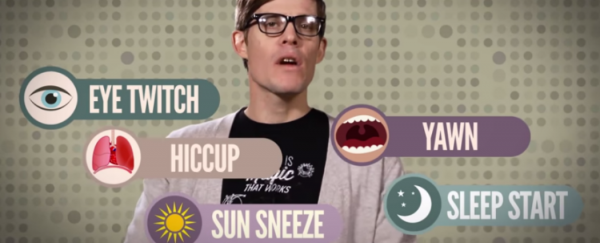
Our bodies are nothing short of amazing. Think about all the things they do without us even having to give it a second thought. Imagine having to regulate your breathing, heartbeats, temperature, and digestion - all while you're sitting there trying to work. So it's a great thing that our bodies put a lot of a whole lot of processes on autopilot, but it does lead to some strange, well, noises, ticks, smells, and facial expressions.
Who hasn't felt one of their eyes start involuntary twitching while you're in the middle of a job interview? This odd behaviour has a number of different causes, says Joe Hanson in the latest episode of It's Okay To Be Smart, including dryness, caffeine, bright lights, a tough workout, and yep, good, old-fashioned tiredness. Here's a tip - step away from the computer screen… slowly… slowly… there you go.
Turns out, bright light makes us do a bunch of involuntary things, including one behaviour that stumped Aristotle himself. He asked, 'Why do we sneeze more after we've looked at the Sun?' Named the photic sneeze reflex - or, if you want more words, the autosomal cholinergic helio-ophthalmic outburst, which is abbreviated, amazingly, to ACHOO - this phenomenon is experienced by one in five people, which has led scientists to suspect it's genetically inherited. And while no one's exactly sure what causes it, it's thought that its an interaction between the optic nerve and the trigemenal ganglion - the nerve that feeds that tickling sensation in your nose.
Are you one of those people who could be very happily floating through Dreamworld, when all of a sudden, you wake with a start, giving your partner next to you a heart attack in the process? These episodes are known as 'sleep starts', and Joe explains that when we drift off, the areas of our brain that control basic motor function are inactivated, so those that control our sleep cycles can take over. "Which is why you can dream about riding your bike without actually moving your feet," he says. But the sleeping parts of our brain fight with the motor control parts of our brain as we sleep, and when the motor control parts win? Well, I just hope your cat isn't within involuntary kicking distance.
We've left the best till last - the dreaded hiccup, and the innocuous yawn, both as mysterious and frustratingly involuntary as each other. I'll let Joe explain how they work in the episode of It's Okay To Be Smart above, because it's really not the same without pictures of lazy cats and strange-looking sea creatures to really drive the science of it all home. You're welcome.
Source: It's Okay To Be Smart
